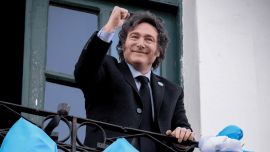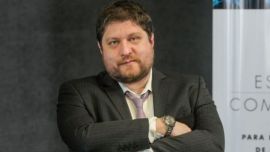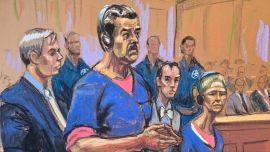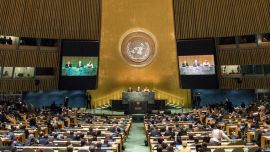Two Catholic priests were each sentenced to more than 40 years in prison for sexually abusing deaf children, a court in the western city of Mendoza ruled Monday.
A three-judge panel in Mendoza sentenced Italian priest Reverend Nicola Corradi to 42 years in prison and the Argentine priest Reverend Horacio Corbacho to 45 years, for abusing children at the Antonio Próvolo Institute for Deaf and Hearing Impaired Children in Luján de Cuyo, a municipality in northwestern Argentina, between 2004 and 2016.
Corradi, an 83-year-old Italian, and Corbacho, a 59-year-old Argentine, were arrested in 2016. The institution's gardener, Armando Gómez, was also jailed for 18 years for sexual abuse. The victims are 10 former students.
The court said the sentences took into account the aggravating circumstances that the priests were responsible for the children's wellbeing, as well as the fact that the victims were minors.
The accused declined to make statements ahead of the judges’ ruling. They appeared somber as they arrived in the courtroom, with Corradi in a wheelchair, his gaze fixed on the ground.
utside the court a group of young people celebrated, after waiting for the ruling with banners supporting the victims.
Corbacho, 59, and 83-year-old Corradi had been held in preventive detention since their arrest three years ago on charges of child sex abuse at the school.
Apart from the gardener, several other staff at the school were taken into custody after the allegations of abuse first came to light in 2016, and the institute, 1,000 kilometres west of Buenos Aires, was shut down.
They included a 42-year-old Japanese nun, Kosaka Kumiko, who was arrested later after surrendering to authorities. She was charged with complicity with the two priests.
The case has shocked Argentines — as did the revelation that Corradi had been previously accused of similar offences at a sister agency, the Antonio Próvolo Institute in Verona, Italy, but was never charged.
The Vatican had known about Corradi since at least 2009, when the Italian Provolo students went public with tales of abuse and named names. The Vatican ordered an investigation and sanctioned four accused priests, but Corradi apparently never was sanctioned in Italy.
The defendants, who pleaded innocence, said the students’ stories were improbable.
“The Argentine court has given the traumatised children of Próvolo a measure of justice that the Catholic Church failed to give them,” said Anne Barrett Doyle, co-founder of the online research database BishopAccountability.org, to the Associated Press.
“The horror of Próvolo is twofold: the torture of the children and the Church’s failure to prevent it. We hope the prosecutors now will launch a criminal investigation of the archbishops and other church leaders who knew or should have known that the school was being run by a child molester.”
She also criticised Argentine pontiff Pope Francis.
Doyle also said that “the Pope too must accept responsibility for the unimaginable suffering of these children. He ignored repeated warnings that Corradi was in Argentina.”
Pope Francis has not commented publicly on the case, though in 2017, the Vatican sent two Argentine priests to investigate what happened in Mendoza.
Dante Simón, a judicial vicar, told The Associated Press that the "horrible" allegations are "more than plausible." He said the pontiff expressed his sadness and told him that "he was very worried about this situation."
In a report submitted to the Vatican that June, Simon requested the maximum canonical penalty for Corradi and Corbacho, that they be made to "resign directly by the Holy Father." His report must be reviewed by the Congregation for the Doctrine of the Faith.
Corradi, who was the director of the institute, has been under house arrest because of his age, while Corbacho and Gómez were being held in a jail in the provincial capital of Mendoza.
Former students, young men and women, testified that the priests touched and sometimes raped them in their dormitories and school bathrooms. They also said they were forced to look at pornographic images. They said they were warned to keep quiet.
Investigators found records of complaints made by parents that weren’t followed up, photographs of a naked girl on Corbacho's computer and chains he allegedly used to subdue one girl.
Many in Argentina have asked why Francis did not remove Corradi as the authority at the Mendoza school once he learned of the allegations in Verona.
Corradi’s name appeared publicly in 2009, when 67 people said they were abused at the Verona institute by 24 priests, lay people and religious brothers, and specifically said that Corradi was in Argentina.
In 2012, the diocese of Verona asked for forgiveness from the victims and sanctioned 24 of the accused, although Corradi was not among them. None of the cases ever went to trial.
Corradi’s name appeared again in 2014 in a letter written to the Pope by deaf students in Verona that reiterated the potential danger he posed in Mendoza.
The trial began on August 5 and heard evidence from 13 victims from the institute during in camera hearings.
In a fast-tracked trial last year, a former altar boy, Jorge Bordon, 50, received a 10-year sentence after pleading guilty to the sexual abuse of five children.
Another of the defendants was deemed mentally incompetent by the court for being disabled and having suffered sexual abuse himself as a child.
Fourteen more defendants are facing trial in two other separate cases involving the school.
Other cases
Prosecutors have investigated other cases of abuse at the La Plata branch of the Provolo Institute which will also go to trial.
"Life was very bad in there," one of the victims, 18-year-old Ezequiel Villalonga, told the AFP news agency at the beginning of the trial, highlighting the vulnerability of the children at the Mendoza school.
"We didn't learn anything. We didn't have any communication," Villalonga said of the school, set up to educate children with impaired hearing or speech disorders.
"We didn't know sign language, we didn't know what we were writing, we asked other classmates and, also, nobody understood anything."
– TIMES/AP/AFP


























Comments